- Home
- Beverly Cleary
Ramona Quimby, Age 8
Ramona Quimby, Age 8 Read online
Beverly Cleary
Ramona Quimby, Age 8
Illustrated by
Tracy Dockray
Contents
1 The First Day of School
2 At Howie’s House
3 The Hard-boiled Egg Fad
4 The Quimbys’ Quarrel
5 The Extra-good Sunday
6 Supernuisance
7 The Patient
8 Ramona’s Book Report
9 Rainy Sunday
About the Author
Other Books by Beverly Cleary
Credits
Copyright
About the Publisher
1
The First Day of School
Ramona Quimby hoped her parents would forget to give her a little talking-to. She did not want anything to spoil this exciting day.
“Ha-ha, I get to ride the bus to school all by myself,” Ramona bragged to her big sister, Beatrice, at breakfast. Her stomach felt quivery with excitement at the day ahead, a day that would begin with a bus ride just the right length to make her feel a long way from home but not long enough—she hoped—to make her feel carsick. Ramona was going to ride the bus, because changes had been made in the schools in the Quimbys’ part of the city during the summer. Glenwood, the girls’ old school, had become an intermediate school, which meant Ramona had to go to Cedarhurst Primary School.
“Ha-ha yourself.” Beezus was too excited to be annoyed with her little sister. “Today I start high school.”
“Junior high school,” corrected Ramona, who was not going to let her sister get away with acting older than she really was. “Rosemont Junior High School is not the same as high school, and besides you have to walk.”
Ramona had reached the age of demanding accuracy from everyone, even herself. All summer, whenever a grown-up asked what grade she was in, she felt as if she were fibbing when she answered, “third,” because she had not actually started the third grade. Still, she could not say she was in the second grade since she had finished that grade last June. Grown-ups did not understand that summers were free from grades.
“Ha-ha to both of you,” said Mr. Quimby, as he carried his breakfast dishes into the kitchen. “You’re not the only ones going to school today.” Yesterday had been his last day working at the checkout counter of the ShopRite Market. Today he was returning to college to become what he called “a real, live school teacher.” He was also going to work one day a week in the frozen-food warehouse of the chain of ShopRite Markets to help the family “squeak by,” as the grown-ups put it, until he finished his schooling.
“Ha-ha to all of you if you don’t hurry up,” said Mrs. Quimby, as she swished suds in the dishpan. She stood back from the sink so she would not spatter the white uniform she wore in the doctor’s office where she worked as a receptionist.
“Daddy, will you have to do homework?” Ramona wiped off her milk moustache and gathered up her dishes.
“That’s right.” Mr. Quimby flicked a dish towel at Ramona as she passed him. She giggled and dodged, happy because he was happy. Never again would he stand all day at a cash register, ringing up groceries for a long line of people who were always in a hurry.
Ramona slid her plate into the dishwater. “And will Mother have to sign your progress reports?”
Mrs. Quimby laughed. “I hope so.”
Beezus was last to bring her dishes into the kitchen. “Daddy, what do you have to study to learn to be a teacher?” she asked.
Ramona had been wondering the same thing. Her father knew how to read and do arithmetic. He also knew about Oregon pioneers and about two pints making one quart.
Mr. Quimby wiped a plate and stacked it in the cupboard. “I’m taking an art course, because I want to teach art. And I’ll study child development—”
Ramona interrupted. “What’s child development?”
“How kids grow,” answered her father.
Why does anyone have to go to school to study a thing like that? wondered Ramona. All her life she had been told that the way to grow was to eat good food, usually food she did not like, and get plenty of sleep, usually when she had more interesting things to do than go to bed.
Mrs. Quimby hung up the dishcloth, scooped up Picky-picky, the Quimbys’ old yellow cat, and dropped him at the top of the basement steps. “Scat, all of you,” she said, “or you’ll be late for school.”
After the family’s rush to brush teeth, Mr. Quimby said to his daughters, “Hold out your hands,” and into each waiting pair he dropped a new pink eraser. “Just for luck,” he said, “not because I expect you to make mistakes.”
“Thank you,” said the girls. Even a small present was appreciated, because presents of any kind had been scarce while the family tried to save money so Mr. Quimby could return to school. Ramona, who liked to draw as much as her father, especially treasured the new eraser, smooth, pearly pink, smelling softly of rubber, and just right for erasing pencil lines.
Mrs. Quimby handed each member of her family a lunch, two in paper bags and one in a lunch box for Ramona. “Now, Ramona—” she began.
Ramona sighed. Here it was, that little talking-to she always dreaded.
“Please remember,” said her mother, “you really must be nice to Willa Jean.”
Ramona made a face. “I try, but it’s awfully hard.”
Being nice to Willa Jean was the part of Ramona’s life that was not changing, the part she wished would change. Every day after school she had to go to her friend Howie Kemp’s house, where her parents paid Howie’s grandmother to look after her until one of them could come for her. Both of Howie’s parents, too, went off to work each day. She liked Howie, but after spending most of the summer, except for swimming lessons in the park, at the Kemps’ house, she was tired of having to play with four-year-old Willa Jean. She was also tired of apple juice and graham crackers for a snack every single day.
“No matter what Willa Jean does,” complained Ramona, “her grandmother thinks it’s my fault because I’m bigger. Like the time Willa Jean wore her flippers when she ran under the sprinkler, pretending she was the mermaid on the tuna-fish can, and then left big wet footprints on the kitchen floor. Mrs. Kemp said I should have stopped her because Willa Jean didn’t know any better!”
Mrs. Quimby gave Ramona a quick hug. “I know it isn’t easy, but keep trying.”
When Ramona sighed, her father hugged her and said, “Remember, kid, we’re counting on you.” Then he began to sing, “We’ve got high hopes, try hopes, buy cherry pie-in-July hopes—”
Ramona enjoyed her father’s making up new words for the song about the little old ant moving the rubber tree plant, and she liked being big enough to be counted on, but sometimes when she went to the Kemps’ she felt as if everything depended on her. If Howie’s grandmother did not look after her, her mother could not work full time. If her mother did not work full time, her father could not go to school. If her father did not go to school, he might have to go back to being a checker, the work that made him tired and cross.
Still, Ramona had too many interesting things to think about to let her responsibility worry her as she walked through the autumn sunshine toward her school bus stop, her new eraser in hand, new sandals on her feet, that quivery feeling of excitement in her stomach, and the song about high hopes running through her head.
She thought about her father’s new part-time job zipping around in a warehouse on a fork-lift truck, filling orders for orange juice, peas, fish sticks, and all the other frozen items the markets carried. He called himself Santa’s Little Helper, because the temperature of the warehouse was way below zero, and he would have to wear heavy padded clothing to keep from freezing. The job sounded like fun to Ramona. She wondered
how she was going to feel about her father’s teaching art to other people’s children and decided not to think about that for a while.
Instead, Ramona thought about Beezus going off to another school, where she would get to take a cooking class and where she could not come to the rescue if her little sister got into trouble. As Ramona approached her bus stop, she thought about one of the best parts of her new school: none of her teachers in her new school would know she was Beatrice’s little sister. Teachers always like Beezus; she was so prompt and neat. When both girls had gone to Glenwood School, Ramona often felt as if teachers were thinking, I wonder why Ramona Quimby isn’t more like her big sister.
When Ramona reached the bus stop, she found Howie Kemp already waiting with his grandmother and Willa Jean, who had come to wave good-by.
Howie looked up from his lunch box, which he had opened to see what he was going to have for lunch, and said to Ramona, “Those new sandals make your feet look awfully big.”
“Why, Howie,” said his grandmother, “that’s not a nice thing to say.”
Ramona studied her feet. Howie was right, but why shouldn’t her new sandals make her feet look big? Her feet had grown since her last pair. She was not offended.
“Today I’m going to kidnergarten,” boasted Willa Jean, who was wearing new coveralls and T-shirt and a pair of her mother’s old earrings. Willa Jean was convinced she was beautiful, because her grandmother said so. Ramona’s mother said Mrs. Kemp was right. Willa Jean was beautiful when she was clean, because she was a healthy child. Willa Jean did not feel she was beautiful like a healthy child. She felt she was beautiful like a grown-up lady on TV.
Ramona tried to act kindly toward little Willa Jean. After all, her family was depending on her. “Not kidnergarten, Willa Jean,” she said. “You mean nursery school.”
Willa Jean gave Ramona a cross, stubborn look that Ramona knew too well. “I am too going to kidnergarten,” she said. “Kidnergarten is where the kids are.”
“Bless her little heart,” said her grandmother, admiring as always.
The bus, the little yellow school bus Ramona had waited all summer to ride, pulled up at the curb. Ramona and Howie climbed aboard as if they were used to getting on buses by themselves. I did it just like a grown-up, thought Ramona.
“Good morning. I am Mrs. Hanna, your bus aide,” said a woman sitting behind the driver. “Take the first empty seats toward the back.” Ramona and Howie took window seats on opposite sides of the bus, which had a reassuring new smell. Ramona always dreaded the people-and-fumes smell of the big city buses.
“By-byee,” called Mrs. Kemp and Willa Jean, waving as if Ramona and Howie were going on a long, long journey. “By-byee.” Howie pretended not to know them.
As soon as the bus pulled away from the curb, Ramona felt someone kick the back of her seat. She turned and faced a sturdy boy wearing a baseball cap with the visor turned up and a white T-shirt with a long word printed across the front. She studied the word to see if she could find short words in it, as she had learned to do in second grade. Earth. Quakes. Earthquakes. Some kind of team. Yes, he looked like the sort of boy whose father would take him to ball games. He did not have a lunch box, which meant he was going to buy his lunch in the cafeteria.
A grown-up would not call him a purple cootie. Ramona faced front without speaking. This boy was not going to spoil her first day in the third grade.
Thump, thump, thump against the back of Ramona’s seat. The bus stopped for other children, some excited and some anxious. Still the kicking continued. Ramona ignored it as the bus passed her former school. Good old Glenwood, thought Ramona, as if she had gone there a long, long time ago.
“All right, Danny,” said the bus aide to the kicking boy. “As long as I’m riding shotgun on this bus, we won’t have anyone kicking the seats. Understand?”
Ramona smiled to herself as she heard Danny mutter an answer. How funny—the bus aide saying she was riding shotgun as if she were guarding a shipment of gold on a stagecoach instead of making children behave on a little yellow school bus.
Ramona pretended she was riding a stagecoach pursued by robbers until she discovered her eraser, her beautiful pink eraser, was missing. “Did you see my eraser?” she asked a second-grade girl, who had taken the seat beside her. The two searched the seat and the floor. No eraser.
Ramona felt a tap on her shoulder and turned. “Was it a pink eraser?” asked the boy in the baseball cap.
“Yes.” Ramona was ready to forgive him for kicking her seat. “Have you seen it?”
“Nope.” The boy grinned as he jerked down the visor of his baseball cap.
That grin was too much for Ramona. “Liar!” she said with her most ferocious glare, and faced front once more, angry at the loss of her new eraser, angry with herself for dropping it so the boy could find it. Purple cootie, she thought, and hoped the cafeteria would serve him fish portions and those canned green beans with the strings left on. And apple wedges, the soft mushy kind with tough skins, for dessert.
The bus stopped at Cedarhurst, Ramona’s new school, a two-story red-brick building very much like her old school. As the children hopped out of the bus, Ramona felt a little thrill of triumph. She had not been carsick. She now discovered she felt as if she had grown even more than her feet. Third graders were the biggest people—except teachers, of course—at this school. All the little first and second graders running around the playground, looking so young, made Ramona feel tall, grown up, and sort of…well, wise in the ways of the world.
Danny shoved ahead of her. “Catch!” he yelled to another boy. Something small and pink flew through the air and into the second boy’s cupped hands. The boy wound up as if he were pitching a baseball, and the eraser flew back to Danny.
“You gimme back my eraser!” Encumbered by her lunch box, Ramona chased Danny, who ran, ducking and dodging, among the first and second graders. When she was about to catch him, he tossed her eraser to the other boy. If her lunch box had not banged against her knees, Ramona might have been able to grab him. Unfortunately, the bell rang first.
“Yard apes!” yelled Ramona, her name for the sort of boys who always got the best balls, who were always first on the playground, and who chased their soccer balls through other people’s hopscotch games. She saw her pink eraser fly back into Danny’s hands. “Yard apes!” she yelled again, tears of anger in her eyes. “Yucky yard apes!” The boys, of course, paid no attention.
Still fuming, Ramona entered her new school and climbed the stairs to find her assigned classroom, which she discovered looked out over roofs and treetops to Mount Hood in the distance. I wish it would erupt, she thought, because she felt like exploding with anger.
Ramona’s new room was filled with excitement and confusion. She saw some people she had known at her old school. Others were strangers. Everyone was talking at once, shouting greetings to old friends or looking over those who would soon become new friends, rivals, or enemies. Ramona missed Howie, who had been assigned to another room, but wouldn’t you know? That yard ape, Danny, was sitting at a desk, still wearing his baseball cap and tossing Ramona’s new eraser from one hand to another. Ramona was too frustrated to speak. She wanted to hit him. How dare he spoil her day?
“All right, you guys, quiet down,” said the teacher.
Ramona was startled to hear her class called “you guys.” Most teachers she had known would say something like, “I feel I am talking very loud. Is it because the room is noisy?” She chose a chair at a table at the front of the room and studied her new teacher, a strong-looking woman with short hair and a deep tan. Like my swimming teacher, thought Ramona.
“My name is Mrs. Whaley,” said the teacher, as she printed her name on the blackboard. “W-h-a-l-e-y. I’m a whale with a y for a tail.” She laughed and so did her class. Then the whale with a y for a tail handed Ramona some slips of paper. “Please pass these out,” she directed. “We need some name tags until I get to know you.”
> Ramona did as she was told, and as she walked among the desks she discovered her new sandals squeaked. Squeak, creak, squeak. Ramona giggled, and so did the rest of the class. Squeak, creak, squeak. Ramona went up one aisle and down the other. The last person she gave a slip to was the boy from the bus, who was still wearing his baseball cap. “You give me back my eraser, you yard ape!” she whispered.
“Try and get it, Bigfoot,” he whispered back with a grin.
Ramona stared at her feet. Bigfoot? Bigfoot was a hairy creature ten feet tall, who was supposed to leave huge footprints in the mountain snows of southern Oregon. Some people thought they had seen Bigfoot slipping through the forests, but no one had ever been able to prove he really existed.
Bigfoot indeed! Ramona’s feet had grown, but they were not huge. She was not going to let him get away with this insult. “Superfoot to you, Yard Ape,” she said right out loud, realizing too late that she had given herself a new nickname.
To her astonishment, Yard Ape pulled her eraser out of his pocket and handed it to her with a grin. Well! With her nose in the air, Ramona squeaked back to her seat. She felt so triumphant that she returned the longest way around and bent her feet as much as she could to make the loudest possible squeaks. She had done the right thing! She had not let Yard Ape upset her by calling her Bigfoot, and now she had her eraser in her hand. He would probably call her Superfoot forever, but she did not care. Superfoot was a name she had given herself. That made all the difference. She had won.
Ramona became aware that she was squeaking in the midst of an unusual silence. She stopped midsqueak when she saw her new teacher watching her with a little smile. The class was watching the teacher.
“We all know you have musical shoes,” said Mrs. Whaley. Of course the class laughed.

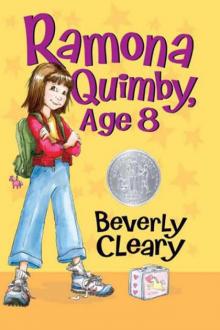 Ramona Quimby, Age 8
Ramona Quimby, Age 8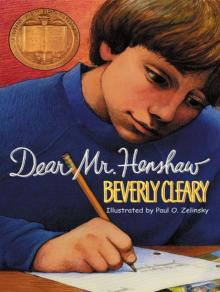 Dear Mr. Henshaw
Dear Mr. Henshaw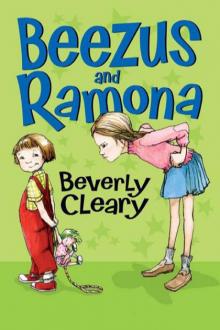 Beezus and Ramona
Beezus and Ramona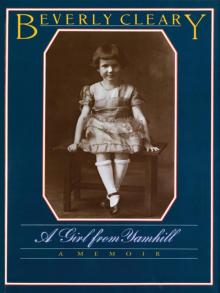 A Girl from Yamhill
A Girl from Yamhill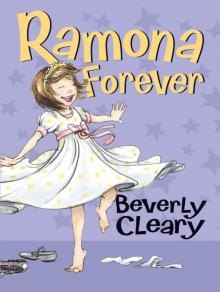 Ramona Forever
Ramona Forever Jean and Johnny
Jean and Johnny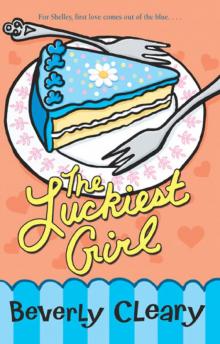 The Luckiest Girl
The Luckiest Girl Emily's Runaway Imagination
Emily's Runaway Imagination Ribsy
Ribsy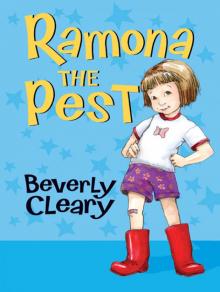 Ramona the Pest
Ramona the Pest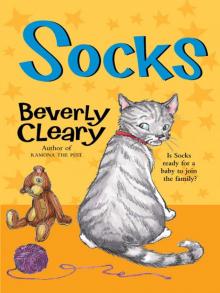 Socks
Socks Ramona's World
Ramona's World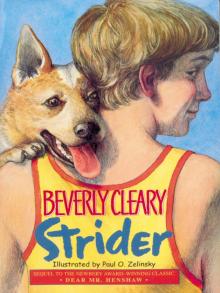 Strider
Strider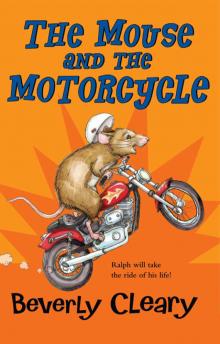 The Mouse and the Motorcycle
The Mouse and the Motorcycle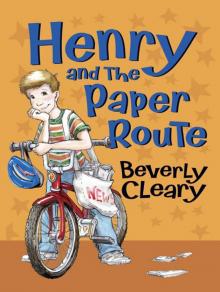 Henry and the Paper Route
Henry and the Paper Route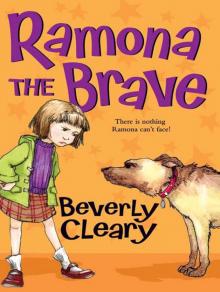 Ramona the Brave
Ramona the Brave Henry Huggins
Henry Huggins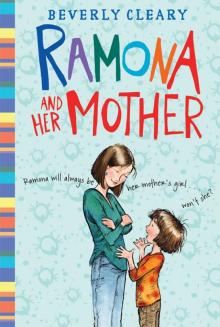 Ramona and Her Mother
Ramona and Her Mother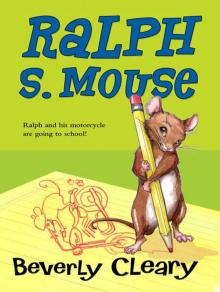 Ralph S. Mouse
Ralph S. Mouse Sister of the Bride
Sister of the Bride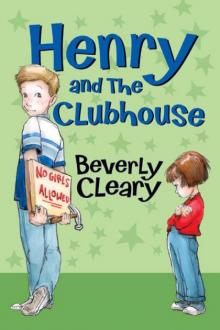 Henry and the Clubhouse
Henry and the Clubhouse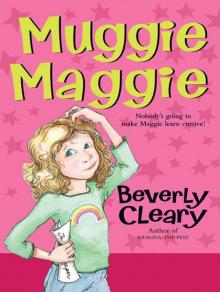 Muggie Maggie
Muggie Maggie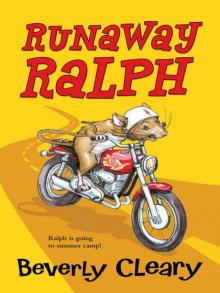 Runaway Ralph
Runaway Ralph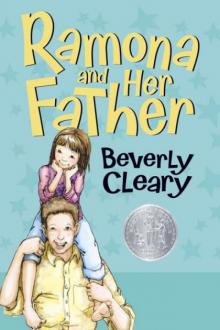 Ramona and Her Father
Ramona and Her Father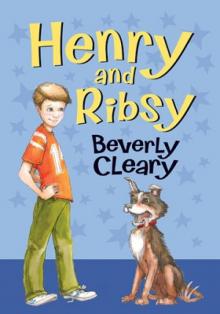 Henry and Ribsy
Henry and Ribsy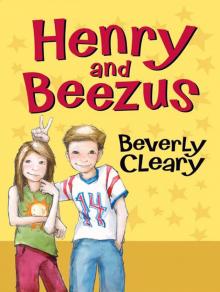 Henry and Beezus
Henry and Beezus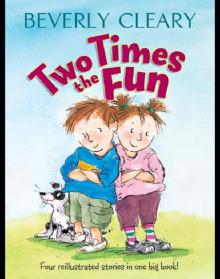 Two Times the Fun
Two Times the Fun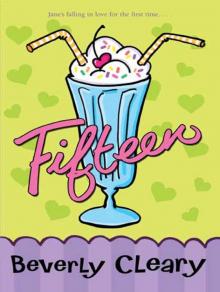 Fifteen
Fifteen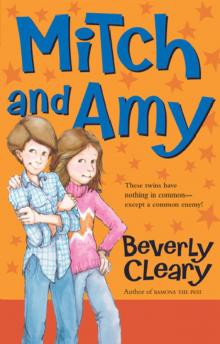 Mitch and Amy
Mitch and Amy